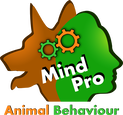FAQ
|
Below are a few questions answered.
If your question is still not answered, don't hesitate to send us an email Email at [email protected] |
How much would it cost?
| Service Price List - Mind Pro Animal Behaviour | |
| File Size: | 174 kb |
| File Type: | |
Can you solve my dog's problem?
What is your experience?
How are you going to help us out?
What training do you use?
Do you use treats?
Where do we meet?
- Once we have identify what you would like to improve, and understand your dogs motivations behind the unwanted behaviour, than we can look at what solution would work for both you and your dog and Deb will coach you through the solution.
- When strong emotions are linked to your dog's behaviour (over-excitement, fear, frustration, ...), the change in this behaviour can take longer then simply teaching your dog to do a specific behaviour (sit, down, come, ...). At times a discussion with your vet, or a vet behaviourist may occur to see if the help of medication or natural remedies could help your dog being in a better state of mind so as to be capable to learn and retain new information.
- See our agreement form for more details.
What is your experience?
- See the about page where you can see Deb's qualifications and experience.
How are you going to help us out?
- Deb works a bit like a life coach, but specialising in the dog-human relationship. She usually starts teaching you and your dogs some skills at home, where you can both concentrate and practice, before you can start tasting it in the real life (like sports where you train your skills before signing up for a competition). Some would call that being a "concept trainer". This is why she offers programs that will be tailored to your goals and the needs of your dog.
What training do you use?
- Force-free through association and consequences following the LIMA principle (Least Intrusive, Minimally Aversive).
- Let's start at kindergarten before jumping up to a Uni level of this situation.
- Deb trains you and your dog for the situation instead of in the situation. Most skills and concepts can be learned through games to keep both humans and dogs motivated. For example, take a dog barking at the window. Deb will not try to train the dog when he is already barking, as this is when the dog is really distracted and not able to concentrate. She teaches you to train your dog a skill that will be useful in this situation (like relax on your bed, or "touch" my hand for example) .
- We will figure out what concept/skill/game works best for both you and your dog.
- Life skills over obedience. For example, for your dog liking to be in your proximity will help with loose leash walking and coming back when called.
Do you use treats?
- If your worry is about "my dog isn't food focus" or "I will always need the food to get my dog to behave" or "my dog is on a special diet" or "my dog will get fat" then rest assure that this should't be an issue.
- Using treats has a lot of variable to it: what treat, size of the treat, how many, timing on getting a treat, how is that treat given to your dog (called experience of the delivery). This can change your dog's motivation and energy in multitude ways.
- Deb do primarily use treats to start with as this is a quick way to let your dog's brain know they just done the correct behaviour. But there is plenty of other rewards that can be used like toys, voice, pats, games, smells, ...
- Your dog's meal can be use as rewards for the training.
- Like a baby learning to walk, you encourage them not even when they take one step, but just for the effort of trying. Now you don't tell everyone walking how great that is. This is a behaviour that is rewarding on itself as it gives you freedom of movement and access to resources and rewards. So a bit different then your job for example, where you still want to be paid at some stage, even if you like your job. Anything new needs more feedback (i.e. treats) then something you know really well won't need as much feedback (less treats overtime, or value transferred to an access to something they want or transferred to the pleasure of the experience/behaviour).
Where do we meet?
- Most of the time, the 1st session will be at yours, and for the programs, it may be a few more starting the training at home.
- In some rare cases Deb will meet you straight away in the place that you're finding challenging.
- Out of Christchurch? You can either pay a travel fee for Deb to still meet at yours, or you will be able to arrange to meet somewhere in Christchurch.
Got a question?
Email us today at [email protected]
Please note that certain email apps mistakenly divert messages from new contacts or with certain words into the app's Spam/Junk folder. Please check this folder in your email app if you don't hear from us within a few days.
Professional animal trainer & dog behaviour consultant
Email us today at [email protected]
Please note that certain email apps mistakenly divert messages from new contacts or with certain words into the app's Spam/Junk folder. Please check this folder in your email app if you don't hear from us within a few days.
Professional animal trainer & dog behaviour consultant




